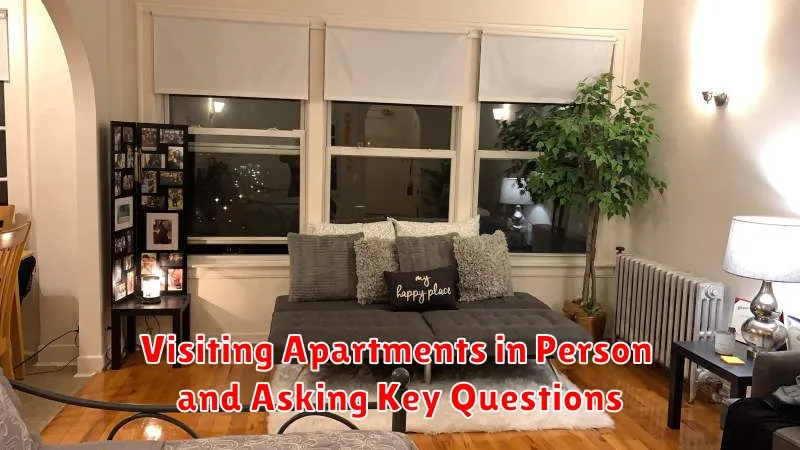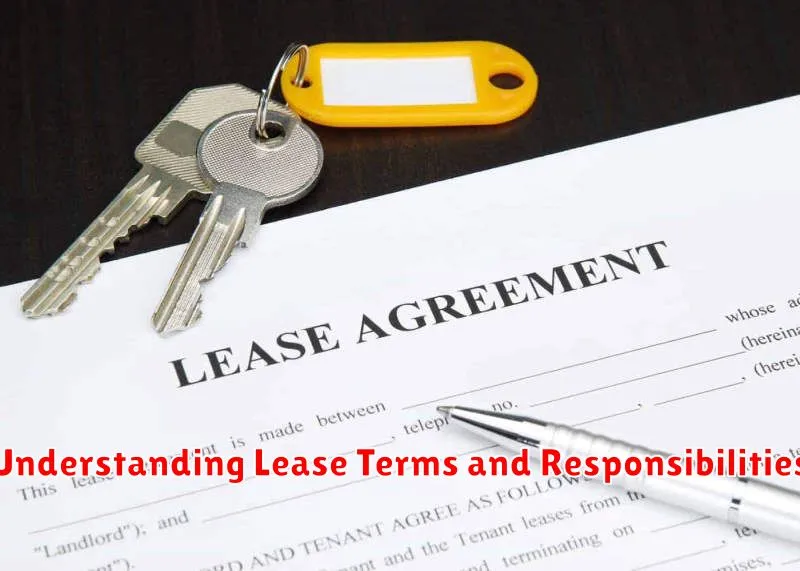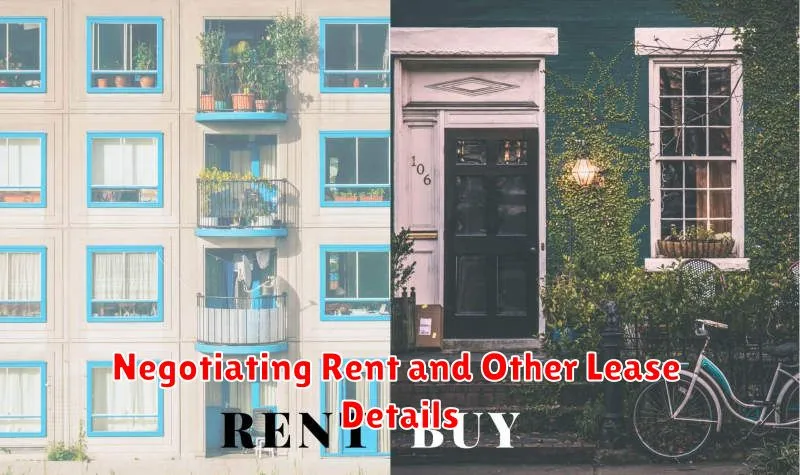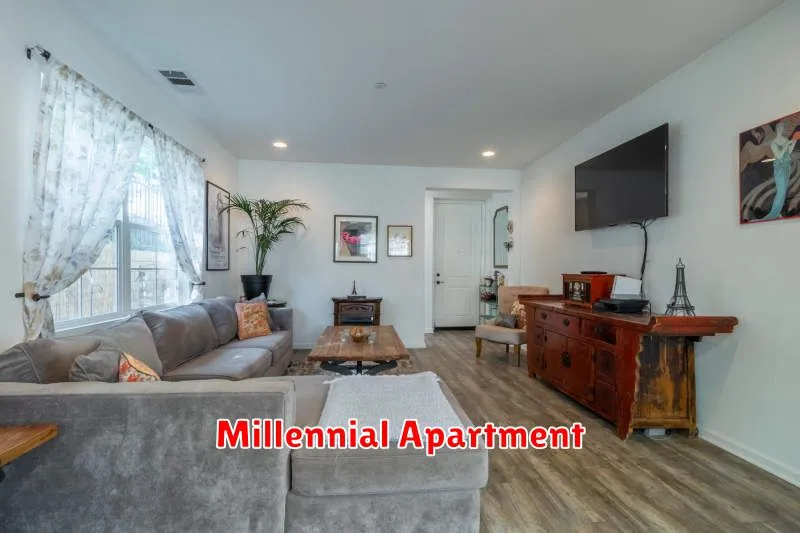Are you a millennial looking for the perfect apartment? Navigating the rental market can be overwhelming, but don’t worry, we’re here to help! This guide provides essential apartment hunting tips specifically tailored for your generation. From understanding your budget and finding the right neighborhood to negotiating a great lease, we’ll equip you with the knowledge you need to secure your dream apartment. So, let’s dive in and make apartment hunting a breeze!
Defining Your Apartment Needs and Priorities
Before you even start browsing listings, it’s essential to take some time to figure out what you really need and want in an apartment. This will help you narrow your search and avoid wasting time on places that aren’t a good fit. Start by considering the following factors:
Location: How important is it to be close to work, public transportation, or your favorite hangouts? Are you willing to live in a certain neighborhood or are you open to exploring different areas?
Budget: How much can you realistically afford to spend on rent each month? Don’t forget to factor in utilities, parking, and any other potential costs. Also, remember that rent prices can fluctuate, so it’s best to be prepared for a range.
Size: How much space do you need? Are you looking for a studio, a one-bedroom, or something larger? If you’re sharing with roommates, consider how much space each person will need.
Amenities: What features are important to you? Do you need in-unit laundry, a gym, a pool, or a rooftop deck? While amenities can be nice, remember that they also add to the cost of rent.
Lifestyle: What kind of lifestyle do you want to live? Are you looking for a quiet and peaceful community or a lively and vibrant neighborhood? Once you know what you’re looking for, you can start to search for apartments that meet your criteria.
By taking the time to define your needs and priorities, you’ll be well on your way to finding the perfect apartment for you.
Setting a Realistic Budget for Rent and Utilities
Before you start looking at apartments, it’s important to figure out how much you can afford to spend on rent and utilities. This will help you narrow down your search and avoid getting into a financial bind. A good rule of thumb is to spend no more than 30% of your gross income on rent and utilities. This means that if you earn $3,000 per month, you should aim to spend no more than $900 on rent and utilities.
To calculate a realistic budget, consider your monthly expenses, such as:
- Food
- Transportation
- Entertainment
- Debt payments
- Savings
Once you have a good understanding of your expenses, you can start to figure out how much you have left over for rent and utilities. Be sure to factor in hidden costs, such as:
- Security deposit
- First month’s rent
- Last month’s rent (in some cases)
- Application fees
- Utility deposits
Leveraging Online Resources and Apps for Apartment Searching
In today’s digital age, apartment hunting has become significantly easier and more efficient thanks to the abundance of online resources and apps available. These tools empower millennials to streamline their search, access comprehensive information, and ultimately find their ideal apartment. Here are some key ways to leverage these resources:
Apartment Listing Websites: Websites like Zillow, Trulia, Apartments.com, and Rent.com provide a vast database of listings from various sources. They allow you to filter by location, price range, number of bedrooms, and other criteria. Many websites offer virtual tours, 3D models, and detailed property information, enabling you to get a comprehensive overview of available apartments.
Specialized Apps: Numerous apps cater specifically to apartment hunting. For example, StreetEasy focuses on New York City, while PadMapper offers a wider range of cities. These apps often incorporate features like neighborhood guides, crime statistics, and transit information, providing valuable insights for your decision-making process.
Social Media: Social media platforms, particularly Facebook groups and neighborhood forums, can be invaluable for gathering information. Join local groups dedicated to housing or apartment rentals to access insights from residents, landlords, and fellow renters. You can also find recommendations for reputable real estate agents and property management companies.
Online Reviews and Ratings: Websites like Yelp and Google Reviews offer user-generated reviews of apartments, landlords, and management companies. These reviews can provide firsthand accounts of living experiences, helping you assess the quality of the property and the landlord’s responsiveness.
Virtual Tours and 3D Models: Many listings now include virtual tours or 3D models, allowing you to explore the apartment remotely. This feature saves you time and effort by enabling you to pre-screen properties before scheduling physical viewings.
Online Rental Applications: Most online resources and apps allow you to submit rental applications online. This streamlines the application process, eliminating the need for physical paperwork and facilitating faster communication with landlords.
By leveraging these online resources and apps, millennials can significantly enhance their apartment hunting experience. They gain access to a wealth of information, streamline the search process, and make informed decisions when choosing their next home.
Exploring Different Neighborhoods and Their Amenities
Once you’ve established your budget, it’s time to start exploring different neighborhoods. It’s important to consider what’s important to you and what you’re looking for in a neighborhood. This will help you narrow down your choices and make the apartment hunting process more efficient.
When exploring neighborhoods, consider factors such as:
- Accessibility: How easy is it to get around? Is there good public transportation? Are there nearby highways or major roads?
- Safety: How safe is the neighborhood? Are there high crime rates? Is there a lot of foot traffic at night?
- Amenities: Are there restaurants, shops, bars, and other amenities nearby? What about parks and green spaces?
- Community: What is the overall vibe of the neighborhood? Is it a diverse community? Is there a sense of community?
It’s also a good idea to visit different neighborhoods at different times of day to get a feel for the area. This will help you get a better sense of the noise level, traffic, and overall atmosphere.
Once you’ve found a few neighborhoods you like, it’s time to start looking at apartments. But don’t forget to consider the amenities offered by the neighborhood itself. Some neighborhoods might have shared amenities like gyms, pools, or laundry facilities that you can use even if you’re not living in a building that offers them.
Exploring neighborhoods and considering amenities beyond just the apartment itself will help you find a place that suits your needs and lifestyle.
Considering Commute Times and Transportation Options
When hunting for an apartment, especially in a bustling city, one of the most critical factors to consider is the commute. You’ll be spending a significant portion of your time traveling to and from work, so finding a place with a reasonable commute is crucial.
Before embarking on your apartment search, carefully assess your daily commute. Factor in the type of transportation you’ll be utilizing. Will you be driving, taking public transit, biking, or walking? Once you have a good understanding of your preferred mode of transportation, consider these tips:
Explore public transportation options: If you plan to rely on public transit, research the routes, schedules, and reliability of the system in your potential neighborhoods. Look for apartments near major transit hubs to minimize travel time.
Factor in traffic patterns: If you’ll be driving, research the traffic conditions during peak hours in your potential areas. Look for apartments near highways or major roads to simplify your commutes.
Check for bike-friendly infrastructure: If you’re an avid cyclist, consider the availability of bike lanes, bike racks, and bike-sharing programs in your chosen neighborhood.
Think about walking: If you prefer to walk, assess the distance from your potential apartment to your workplace. If you’re comfortable walking, look for apartments near parks, restaurants, or other amenities that enhance your daily routine.
Remember, the right commute significantly impacts your quality of life, impacting your stress levels, time management, and overall well-being. By thoughtfully considering your transportation options and commute time, you’ll find an apartment that works seamlessly with your lifestyle and allows you to navigate the city with ease.
Visiting Apartments in Person and Asking Key Questions

After you’ve narrowed down your apartment search to a few promising options, it’s time to schedule in-person viewings. This is your chance to get a feel for the space, the neighborhood, and the building itself. Don’t just rely on pictures and descriptions – take the time to truly experience the apartment.
During your visit, be sure to ask some key questions:
- What are the building’s amenities? Do they include a gym, laundry facilities, a swimming pool, or a rooftop terrace? What are the hours of operation for these amenities?
- Is parking available? If so, what are the costs and parking options?
- What are the building’s rules and regulations? Are there any restrictions on pets, noise levels, or guests?
- Are there any upcoming renovations or construction planned? This could affect your peace and quiet.
- What is the security like in the building and neighborhood? Are there security cameras, doormen, or other security measures in place?
- What is the neighborhood like? Is it safe, walkable, and convenient for your needs? Are there any nearby parks, shops, or restaurants?
- What is the landlord like? Are they responsive to tenant needs? Are there any issues with the current tenants?
By asking these questions, you can gain a better understanding of the apartment and the building, and determine if it’s the right fit for your lifestyle.
Checking Apartment Reviews and Ratings Online
Before you even think about stepping foot in an apartment, check out what other people are saying about it online! Websites like ApartmentRatings.com, Apartments.com, and Google Reviews offer a wealth of information from tenants who have lived in the building. This is a great way to get a sense of the pros and cons of the apartment, including issues like noise levels, maintenance, management, and safety. You can also find out about the overall vibe of the building and its surrounding neighborhood.
When reading reviews, it’s important to be critical and look for patterns. If there are several complaints about the same issue, it’s probably something to consider. But also keep in mind that some reviews may be biased or exaggerated. Try to read a variety of reviews and form your own opinion.
Checking online reviews and ratings is a crucial step in your apartment hunting journey. It can help you avoid potential headaches and find a place that truly meets your needs. So don’t skip this step – it’s worth the time!
Understanding Lease Terms and Responsibilities

When you’re apartment hunting, it can be easy to get caught up in the excitement of finding the perfect place. However, it’s crucial to take the time to carefully review the lease agreement before signing on the dotted line. Understanding the terms of your lease will ensure that you’re aware of your rights and responsibilities as a tenant.
Here are some key lease terms to pay close attention to:
- Lease Duration: This outlines the length of your lease agreement. It’s important to understand the commitment you’re making, as early termination can often result in penalties.
- Rent Amount and Due Date: The lease should clearly state the monthly rent amount and the due date. Make sure you understand any late fees or penalties for missed payments.
- Security Deposit: This is a refundable deposit paid upon signing the lease, typically used to cover any damages to the unit. Understand the conditions under which you can get your security deposit back.
- Pet Policy: If you have pets, be sure to check the pet policy. Some landlords may have breed restrictions, pet fees, or other requirements.
- Utilities: Determine which utilities are included in your rent and which you are responsible for paying separately. This can include electricity, gas, water, trash, and internet.
- Parking: If parking is included, understand the rules and restrictions for parking on the property.
- Maintenance and Repairs: The lease should outline who is responsible for maintaining and repairing the apartment unit.
- Noise and Guest Restrictions: Be aware of any limitations on noise levels or the number of guests you can have in your apartment.
By thoroughly reviewing your lease agreement, you can protect yourself from potential issues in the future. If anything is unclear, don’t hesitate to ask your landlord or property manager for clarification.
Negotiating Rent and Other Lease Details

Once you’ve found an apartment you like, it’s time to negotiate the terms of the lease. While you may not be able to negotiate the rent itself, you can still try to get a better deal on other aspects of the lease, like the security deposit, the length of the lease, and even some amenities.
Here are some tips for negotiating rent and other lease details:
- Be prepared to walk away. If you’re not happy with the terms of the lease, don’t be afraid to walk away. This may give the landlord incentive to negotiate.
- Research the market. Before you start negotiating, take some time to research the market in your area. This will help you understand what’s a fair price for rent and other lease terms.
- Be polite and respectful. Even if you’re not happy with the terms of the lease, it’s important to be polite and respectful when negotiating with the landlord. This will help you maintain a good relationship with them, which may be helpful in the future.
- Consider offering a longer lease term. Landlords often prefer tenants who sign longer leases, as it gives them more stability. If you’re willing to sign a longer lease, you may be able to negotiate a lower rent or other concessions.
- Ask about concessions. Landlords may be willing to offer concessions, such as free parking or a month of free rent, to entice tenants. Don’t be afraid to ask about these possibilities.
- Read the lease carefully. Before you sign any lease, make sure you read it carefully and understand all of the terms and conditions.
Negotiating rent and other lease details can be a bit daunting, but it’s definitely worth it. By following these tips, you can increase your chances of getting a better deal on your apartment.
Preparing Your Rental Application and Documents
Once you’ve found a few apartments that you’re interested in, it’s time to start filling out applications. This can be a bit of a chore, but it’s important to make sure you’re prepared with all the necessary documents. Make sure you have a solid understanding of the lease terms and understand your rights and responsibilities as a renter.
Here are a few things to keep in mind when preparing your rental application:
- Read the lease carefully and make sure you understand all of the terms and conditions.
- Be prepared to provide personal information, including your name, address, phone number, and Social Security number. You may also need to provide information about your employment history, income, and credit history.
- Gather all necessary documents, such as your driver’s license, Social Security card, pay stubs, bank statements, and credit report.
- Be truthful and accurate on your application. Lying on your application can result in your application being denied or even a lawsuit.
- Keep copies of all documents that you submit to the landlord.
The more prepared you are, the smoother the process will be. By taking the time to gather all of the necessary documents and read the lease carefully, you can avoid any surprises or delays. This will help you secure your dream apartment and move in with ease.
Tips for Securing Your Ideal Apartment as a Millennial
Finding the perfect apartment can be a daunting task, especially for millennials who are navigating the ever-changing rental market. It’s a competitive market out there, and with limited budgets and ever-growing demands, it can be hard to find an apartment that ticks all your boxes. But don’t worry, with the right strategies and a little elbow grease, you can secure your dream apartment.
Here are some tips to help you find the perfect place to call home:
1. Know your budget. This is arguably the most crucial step in the apartment-hunting process. Determine how much you can realistically afford to spend on rent each month, including utilities and other potential expenses. Remember to factor in other financial obligations, such as student loans or credit card payments, and create a realistic budget that you can stick to.
2. Define your priorities. Before you start browsing listings, take some time to consider your non-negotiable needs and your wants. Do you need a specific number of bedrooms or bathrooms? Are you looking for a pet-friendly building? Do you need laundry in-unit? Create a list of your must-haves and your nice-to-haves, and then prioritize them accordingly.
3. Explore different neighborhoods. Consider the amenities and lifestyle each neighborhood offers. Do you want to be close to public transportation, restaurants, bars, or parks? It’s a good idea to spend time in different neighborhoods to get a feel for the vibe and see if it’s a good fit for you.
4. Be proactive and timely. In the competitive rental market, timing is everything. Once you find an apartment that you like, don’t hesitate! Get in touch with the landlord or property manager immediately and schedule a viewing as soon as possible. Be prepared to act quickly if you find a place that meets your criteria.
5. Show your best self. When you’re meeting with landlords or property managers, be prompt, courteous, and enthusiastic. Don’t be afraid to ask questions and demonstrate your interest in the apartment. If you’re applying for a unit, be sure to submit your application and any required documents promptly.
6. Don’t be afraid to negotiate. While rent prices might be fixed, there may be some room for negotiation on other aspects, such as the security deposit or the length of the lease. Be prepared to discuss your needs and concerns with the landlord or property manager.
Securing an apartment can be a stressful experience, but it’s also an exciting time as you’re starting a new chapter in your life. By being prepared, proactive, and strategic, you can increase your chances of finding the perfect place to call home.

